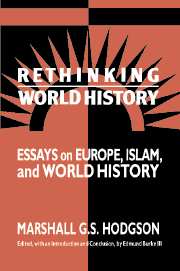Book contents
- Frontmatter
- Contents
- Editor's preface
- Introduction: Marshall G. S. Hodgson and world history
- Part I Europe in a global context
- Part II Islam in a global context
- 7 The role of Islam in world history
- 8 Cultural patterning in Islamdom and the Occident
- 9 The unity of later Islamic history
- 10 Modernity and the Islamic heritage
- Part III The discipline of world history
- Conclusion: Islamic history as world history: Marshall G.S. Hodgson and The Venture of Islam
7 - The role of Islam in world history
Published online by Cambridge University Press: 18 December 2009
- Frontmatter
- Contents
- Editor's preface
- Introduction: Marshall G. S. Hodgson and world history
- Part I Europe in a global context
- Part II Islam in a global context
- 7 The role of Islam in world history
- 8 Cultural patterning in Islamdom and the Occident
- 9 The unity of later Islamic history
- 10 Modernity and the Islamic heritage
- Part III The discipline of world history
- Conclusion: Islamic history as world history: Marshall G.S. Hodgson and The Venture of Islam
Summary
Until the seventeenth century of our era, the Islamicate society that was associated with the Islamic religion was the most expansive society in the Afro-Eurasian hemisphere and had the most influence on other societies. This was in part because of its central location, but also because in it were expressed effectively certain cultural pressures – cosmopolitan and egalitarian (and anti-traditional) – generated in the older and more central lands of this society. The culture of Islamdom offered a norm of international sophistication to many peoples as they were being integrated into the hemispheric commercial nexus. It also offered a flexible political framework for increasing numbers of long-civilized peoples. In this world role, the Islamicate society and culture demonstrated persistent creativity and growth, though some periods were more creative than others, until quite modern times; then the development was disrupted, not by internal decadence but by unprecedented external events. These are viewpoints that I have been forced to develop in the course of attempting a general history of Islamicate civilization, viewpoints that seem to emerge cumulatively from recent studies in several particular fields as well as from the synoptic approach I have adopted. I think they are important for historians, even those outside of Islamic studies, to take cognizance of, though neither the full grounds for them nor their precise implications or limitations can be presented completely here.
In the sixteenth century of our era, a visitor from Mars might well have supposed that the human world was on the verge of becoming Muslim.
- Type
- Chapter
- Information
- Rethinking World HistoryEssays on Europe, Islam and World History, pp. 97 - 125Publisher: Cambridge University PressPrint publication year: 1993
- 2
- Cited by



